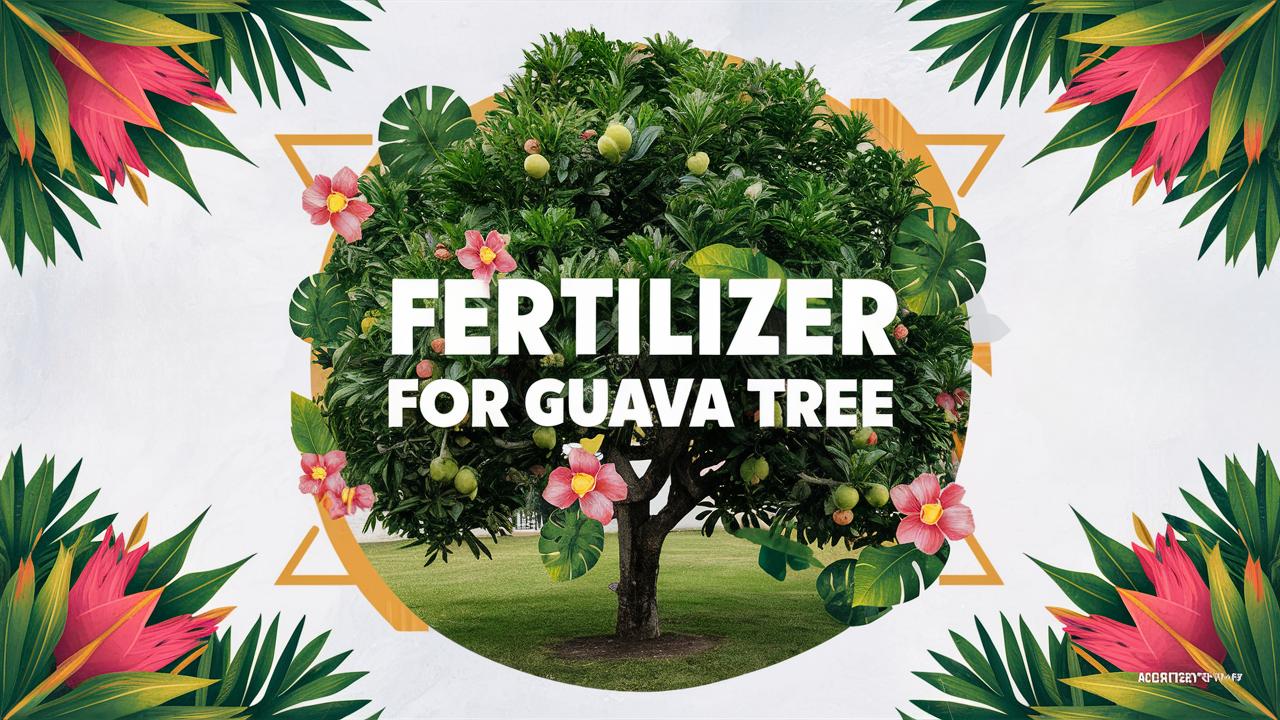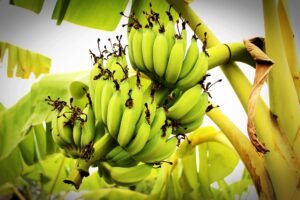This guide will walk you through the essentials of selecting the best fertilizer for your guava trees, ensuring they flourish throughout their growth stages.
Fertilizer For Guava Tree
| Image | Name | Rating | Shop |
|---|---|---|---|
 | Fruit Tree Growth Formula |  | |
 | Fox Farm Fruit Tree Fertilizer |  | |
 | Shake ‘N Feed Citrus, Avocado, Mango Plant Food |  |
Fruit Tree Growth Formula
Fruit tree fertilizers can be numerous but not all are created equal. Take this concentrated fertilizer specifically designed for fruit trees like guava, for example.
This ‘Farmer’s Secret Fruit Tree Booster Fertilizer’ is notable for being easy to use and providing strong results. Mix one teaspoon with a gallon of water to create your own plant food that can be applied weekly for young or mature guava trees. With its phosphorus-rich formula, this product is ideal during the early growth cycle and subsequent season.
Fox Farm Fruit Tree Fertilizer
Guava trees could benefit from the FoxFarm Happy Frog Citrus & Avocado Fertilizer – Formula for Lemons, Oranges, Avocados & More. Despite being marketed as citrus-avocado specific it has a balanced NPK ratio and nutrients that can be beneficial to guava trees.
The fertilizer has nitrogen for healthy growth, calcium for strong cell structure, and sulfur for enhanced nutrient absorption which are all essential nutrients for fruit bearing trees like the guava. Additionally mycorrhizal fungi in the product help boost root strength making it easier for your tree to absorb water and nutrients. For optimal use apply 1-3 cups as recommended on the label depending on the size of your guava tree, three times a year during the growing season.
Shake ‘N Feed Citrus, Avocado, Mango Plant Food
This product, Miracle-Gro Shake ‘N Feed Citrus, Avocado, Mango Plant Food, seems like a great option for guava tree fertilization. The formula is specifically designed to address common nutrient deficiencies in citrus and avocado trees, which are similar to guava trees.
The feed lasts up to three months, providing sustained nutrition for your guava tree. To use, simply shake the product evenly over the soil surface within the spread of the branches, avoiding contact with the trunk or foliage, and water well. For best results, reapply every three months and keep your guava tree well-watered throughout the season.
Organic Fruit & Citrus Fertilizer
If you’re looking for a reliable fertilizer for your guava tree, we recommend considering Jobe’s Organics Granular Garden Fertilizer. This product is specifically designed for use with fruit and citrus trees, making it a great fit for guavas.
The 3-5-5 NPK formula provides the necessary nutrients for high yields and vibrant foliage, while also being OMRI listed for organic gardening by the USDA. We like that this product avoids wasteful runoff, mess, and hazards, minimizing any potential issues with its application. Plus, it’s straightforward to use – simply apply every 4-8 weeks or as needed during the growing season, measuring out the right amount to avoid over-fertilizing your tree.
Tree-tone
The Miracle-Gro Fruit & Citrus Plant Food Spikes is a suitable option for fertilizing guava trees. This product contains natural ingredients and helps promote more fruit and lush foliage when used as directed.
These spikes are easy to apply and release nutrients directly into the root zone, allowing for efficient nutrient uptake by the tree. According to the manufacturer’s instructions, it is recommended to feed your guava tree once per season in Spring and Fall for optimal results. This also makes them a versatile option that can be used on other types of plants such as palm trees.
EZ-gro Citrus Tree Fertilizer
The Citrus Tree Fertilizer – Orange, Lemon, Lime, Mango, Avocado is a well-rounded and effective fertilizer that can be used to promote healthy growth in guava trees as well. While it’s specifically formulated for citrus and tropical fruit trees like lemons, limes, mangoes, and avocados, its balanced formula can also provide the necessary nutrients for other fruit-bearing plants such as guavas.
This fertilizer contains a powerful 20-3-19 NPK formula that delivers nitrogen, phosphorus, and potassium to support lush growth in guava trees. Additionally, it’s infused with essential micronutrients that address common issues like yellowing leaves and poor fruit production – both of which are crucial for maintaining a healthy and productive guava tree. By using this fertilizer, you can give your guava tree the precise plant nutrients it needs to thrive and produce more fruit.
Organic Fruit Tree Blend
The Dr. Earth 70656 Natural Wonder Fruit Tree Fertilizer is a great option for guava trees. This 100% organic and natural fertilizer is specifically designed for fruit trees and berries, making it an ideal choice for guava trees that require a balanced diet to thrive.
This handcrafted blend promotes healthy root development and fruit growth, which can help to increase yields and improve the overall quality of the guava tree’s fruit. Additionally, Dr. Earth fertilizers are made without any unwanted additives such as GMOs or sewage sludge, ensuring that your guava tree stays safe and clean. At 1 lb and 5-5-2 NPK ratio, this mini-sized fertilizer is perfect for smaller guava trees or for those who prefer to fertilize more frequently.
True Fruit & Nut Food
The True Organic Fruit & Nut Food is a great choice for fertilizing your guava tree due to its ability to promote productive growth and prevent blossom end rot. This organic fertilizer provides trees with the necessary nutrients to thrive, resulting in bountiful harvests of guavas for you to enjoy.
This product’s exclusive blend of ingredients also supports overall plant health, allowing your guava tree to grow robustly and produce high-quality yields. With a generous coverage area of up to 70 sq. ft./4lb bag, the True Organic Fruit & Nut Food is perfect for in-ground fruit trees like guavas.
Tree-Tone Organic Fertilizer
For a guava tree, you’ll want to use a fertilizer that’s gentle on the plant yet still provides essential nutrients. Our recommendation is the Espoma TR4 Tree-Tone Organic Plant Food. This formula has a balanced NPK of 6-3-2 and contains calcium, which can help with fruit production.
This product is particularly great for guava trees because it’s ready to use right out of the box – no need to mix or dilute. Simply apply it in the spring and fall as directed, and you should start seeing improvements in your tree’s health and fruit yield. Since Tree-Tone is made from natural and organic ingredients, it’s a safe choice for environmentally conscious gardeners. Plus, it’s approved for use in organic gardening, making it a great option if you’re following that method. Try Espoma TR4 for the best results with your guava tree!
Understanding Guava Trees’ Nutrient Needs
Before diving into the types of fertilizers available, it’s crucial to understand the specific nutrient requirements of guava trees. Like all plants, guava trees need a balanced supply of essential nutrients:
1. Nitrogen (N)
Nitrogen is vital for vegetative growth. It promotes the development of leaves and branches, enhancing the overall vitality of the guava tree. Optimal nitrogen levels contribute to lush green foliage, which is essential for photosynthesis, allowing the tree to produce energy efficiently.
2. Phosphorus (P)
Phosphorus is crucial for root development, flowering, and fruit set. An adequate supply of phosphorus ensures that guava trees mature robustly and are capable of producing fruit abundantly. This nutrient supports the overall metabolic processes, including energy transfer and photosynthesis.
3. Potassium (K)
Potassium strengthens the tree’s ability to resist disease and contributes to overall fruit quality. It helps regulate water usage in plants and is involved in various enzymatic processes. Sufficient potassium leads to sweeter and more flavorful fruits while promoting the tree’s health.
4. Micronutrients
While macronutrients like nitrogen, phosphorus, and potassium are crucial, guava trees also require zinc, iron, manganese, and magnesium in smaller amounts. These micronutrients play various roles in plant metabolism, enzyme functions, and chlorophyll production.
Understanding these nutrient requirements allows you to choose a fertilizer that effectively supports your guava tree’s growth and productivity.
Analyzing Soil Nutrients
Before selecting a fertilizer, it’s imperative to assess the existing nutrient levels in your soil. Conducting a soil test provides a comprehensive profile of your soil’s composition, enabling you to pinpoint any deficiencies.
Conducting a Soil Test
You can obtain a soil testing kit from a local agricultural extension office or retail garden centers. Follow the instructions to collect samples and send them for analysis. The results will reveal not only the macronutrient levels but also the pH and other important factors concerning soil health.
Interpreting the Results
Once you receive the results, pay particular attention to the nitrogen, phosphorus, and potassium levels. A soil pH between 6.0 to 6.5 is ideal for guava trees, as it allows the most effective uptake of nutrients. Based on the deficiency revealed in your soil test, you can make informed decisions on the type and quantity of fertilizer to use.
Types of Fertilizers Suitable for Guava Trees
When it comes to fertilizers, there are several categories—each with its advantages and considerations.
1. Organic Fertilizers
Organic fertilizers derive from natural sources such as plant or animal matter. They improve soil structure, increase microbial activity, and enhance water retention, making them an excellent choice for sustainable gardening.
a. Compost
Compost is rich in nutrients and beneficial microorganisms. Incorporating well-rotted compost into the soil around your guava trees can enrich nutrient content and promote healthy growth. Aim for 2 to 4 inches around the base of the tree every spring.
b. Animal Manure
Manure from herbivores like cows or chickens is another excellent organic option. It is high in nitrogen and helps improve soil structure. However, it’s important to use well-composted manure to avoid introducing pathogens.
c. Fish Emulsion
Fish emulsion is a nutrient-rich liquid fertilizer that provides quick nitrogen availability and traces of other nutrients. Dilute it according to package instructions and apply it as a foliar spray or soil drench.
2. Synthetic Fertilizers
Synthetic fertilizers offer immediate nutrient availability and are commonly formulated with an N-P-K ratio (nitrogen-phosphorus-potassium) to cater to specific plant needs.
a. Balanced Fertilizers
A balanced granular fertilizer, such as 10-10-10 or 14-14-14, provides a steady nutrient supply. Apply it in spring when the guava tree begins to show new growth.
b. Slow-Release Fertilizers
Slow-release fertilizers gradually supply nutrients over an extended period. They reduce the risk of nutrient runoff and require less frequent application than fast-acting varieties. Look for formulations like 14-14-14 with slow-release capabilities.
3. Liquid Fertilizers
Liquid fertilizers can be applied directly to the foliage or root zone and are ideal for providing a quick nutrient boost. They can be especially useful if your guava tree shows signs of nutrient deficiency.
Factors to Consider When Choosing Fertilizer
While understanding nutrient needs and the types of fertilizers is fundamental, several additional factors influence your fertilizer choice.
Soil Type and Texture
Different soil types—the sandy, clayey, or loamy soils—hold nutrients differently. Sandy soils tend to drain quickly and may leach nutrients away, while clay soils retain moisture but may become compacted. Adjust your fertilizer choice accordingly. For sandy soils, you may prefer organic options that improve retention, while clay soils might benefit from balanced commercial fertilizers.
Age and Size of the Tree
Fertilizer needs vary based on the age and size of your guava tree. Young trees generally require less fertilizer compared to mature trees. A standard rule of thumb is to apply less as the tree grows, focusing on the tree’s canopy size. Established guava trees may need up to twice the amount of fertilizer that young trees do.
Time of Year
Timing plays a crucial role in fertilization. The ideal times to fertilize guava trees include:
Spring: As new growth emerges, this is the best time to provide nutrients to support vigorous vegetative growth.
Pre-flowering Phase: As guava trees prepare to flower, apply fertilizer to encourage robust fruit set.
Post-Harvest: After harvesting, fertilize to replenish nutrient levels and prepare for the next growing season.
Seasonality and Local Climate Conditions
Guava trees thrive in tropical and subtropical climates but still exhibit different nutrient needs based on seasonal shifts. During dry months, trees may require more nutrients, while in wet conditions, nutrient uptake may be limited. Understanding local climate influences can help tailor your fertilization schedule accordingly.
Application Techniques for Guava Fertilization
Effective fertilization is as much about the method of application as it is about the choice of fertilizer. Here are some practical techniques for applying fertilizer to guava trees.
Soil Application
For granular fertilizers, spread the appropriate amount evenly around the base of the tree, keeping the fertilizer at least 6 inches away from the trunk to prevent root burn. Water well after application to help the fertilizer penetrate the root zone.
Foliar Feeding
For liquid fertilizers, you can apply them as a foliar spray. This method allows the plant to absorb nutrients directly through its leaves. Apply in the early morning or late afternoon to prevent leaf scorch from the sun.
Fertigation
If you’re looking for efficient nutrient delivery, consider fertigation—applying water-soluble fertilizers through your irrigation system. This method ensures that nutrients are delivered directly to the roots while watering the plants.
Signs of Nutrient Deficiency in Guava Trees
Even with a regular fertilization program, nutrient deficiencies may still occur. Being vigilant for symptoms can help you quickly address any issues.
Yellowing Leaves
Yellowing, especially in older leaves, may indicate nitrogen deficiency. If the yellowing spreads to the whole tree, reassess your fertilization schedule.
Poor Fruit Development
If your guava tree is producing fruits that are small or fail to develop properly, it could be a sign of phosphorus deficiency. This nutrient is crucial during the flowering and fruiting phases.
Leaf Browning and Wilting
Browning leaf edges could signify potassium deficiency, while wilting may indicate that the plant cannot uptake water appropriately due to nutrient imbalances.
Interveinal Chlorosis
This condition typically highlights iron deficiency, where the leaf veins remain green while the surrounding leaf tissue turns yellow. Addressing this with chelated iron can help restore your guava’s health.
Best Practices for Fertilizing Guava Trees
To ensure your guava trees receive the best possible care, consider integrating these best practices into your fertilization regimen.
Regular Monitoring
Maintain a consistent routine of inspecting your guava trees for signs of growth, pests, and nutrient deficiencies. Regular checks enable you to react promptly if a problem arises.
Keep a Fertilization Schedule
Establish a fertilization calendar based on the age of your trees, the season, and the type of fertilizer used. Consistency is key to maximizing your guava tree’s potential.
Mulching
In addition to fertilizers, applying organic mulch around the base of your guava tree can help retain soil moisture, suppress weeds, and gradually improve soil fertility.
Water Management
A well-hydrated guava tree is better able to uptake nutrients. Implement a robust watering schedule, particularly during dry spells. However, avoid overwatering, as this can lead to root rot.
Seek Local Expertise
Don’t hesitate to consult local agricultural extension services or horticulturists who understand regional soil conditions and tailored fertilizer recommendations. They can provide invaluable insights based on your locality.
Conclusion
Choosing the right fertilizer for guava trees is integral to ensuring their health and productivity. Understanding the nutrient requirements, analyzing soil conditions, and selecting appropriate fertilizer types based on your tree’s age, size, and environmental factors will set the foundation for a flourishing guava tree.











